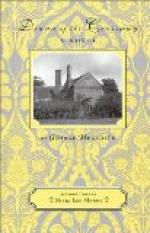He listened, and resumed: ’My view of marriage is, that no man should ask a woman to be his wife unless he is well able to support her in the comforts, not to say luxuries, she is accustomed to.’ His gaze had wandered to the desk; it fixed there. ‘That is Miss Merion’s writing,’ he said.
‘The letter?’ said Lady Dunstane, and she stretched out her hand to press down a leaf of it. ‘Yes; it is from her.’
‘Is she quite well?’
‘I suppose she is. She does not speak of her health.’
He looked pertinaciously in the direction of the letter, and it was not rightly mannered. That letter, of all others, was covert and sacred to the friend. It contained the weightiest of secrets.
‘I have not written to her,’ said Redworth.
He was astonishing: ’To whom? To Diana? You could very well have done so, only I fancy she knows nothing, has never given a thought to railway stocks and shares; she has a loathing for speculation.’
‘And speculators too, I dare say!’
‘It is extremely probable.’ Lady Dunstane spoke with an emphasis, for the man liked Diana, and would be moved by the idea of forfeiting her esteem.
‘She might blame me if I did anything dishonourable!’
‘She certainly would.’
‘She will have no cause.’
Lady Dunstane began to look, as at a cloud charged with remote explosions: and still for the moment she was unsuspecting. But it was a flitting moment. When he went on, and very singularly droning to her ear: ’The more a man loves a woman, the more he should be positive, before asking her, that she will not have to consent to a loss of position, and I would rather lose her than fail to give her all—not be sure, as far as a man can be sure, of giving her all I think she’s worthy of’: then the cloud shot a lightning flash, and the doors of her understanding swung wide to the entry of a great wonderment. A shock of pain succeeded it. Her sympathy was roused so acutely that she slipped over the reflective rebuke she would have addressed to her silly delusion concerning his purpose in speaking of his affairs to a woman. Though he did not mention Diana by name, Diana was clearly the person. And why had he delayed to speak to her?—Because of this venture of his money to make him a fortune, for the assurance of her future comfort! Here was the best of men for the girl, not displeasing to her; a good, strong, trustworthy man, pleasant to hear and to see, only erring in being a trifle too scrupulous in love: and a fortnight back she would have imagined he had no chance; and now she knew that the chance was excellent in those days, with this revelation in Diana’s letter, which said that all chance was over.
‘The courtship of a woman,’ he droned away, ’is in my mind not fair to her until a man has to the full enough to sanction his asking her to marry him. And if he throws all he possesses on a stake . . . to win her—give her what she has a right to claim, he ought . . . . Only at present the prospect seems good . . . . He ought of course to wait. Well, the value of the stock I hold has doubled, and it increases. I am a careful watcher of the market. I have friends—brokers and railway Directors. I can rely on them.’




